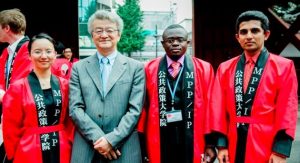What was your purpose in enrolling in GraSPP?
I had the penchant to pursue a career in any international organization dedicated to influencing corporate strategies, public policies and institutional designs towards sustainable economic development in Africa. Consequently, my purpose in enrolling in GraSPP was to leverage the institution’s impeccable pedigree in academia and track record of producing seasoned policy professionals to draw on Japan’s experience which aptly demonstrates how science and technology, public policies and private sector initiatives could accentuate efficiency and bolster resource allocation to drive development outcomes since Japan achieved its growth successfully without natural resources.
What was attractive or stimulating about GraSPP?
The most attractive and stimulating aspects of GraSPP were the thought-provoking lectures, cordial administrative staff-students relationship, and professors with in-depth knowledge and experience. These, among others, contributed to the enviable academic environment in GraSPP. GraSPP was a multi-talent centre embracing innovative and intelligent people from whom I had gained invaluable insight into their rich culture and experiences.
Please share your memorable experiences/courses in GraSPP
 A trip organized and funded by GrasPP for international students in 2011 to Nikko, a historical place in Japan unraveled an interesting sight that makes me feel that Africa today dovetails Japan in the Edo era. Japan, during the Edo era, was characterized by manually driven machines, animal power-driven agricultural equipment, low standard classrooms, bloodshed, etc., but through industrialization drive, formidable public policies, and creativity, the nation metamorphosed into its current state.
A trip organized and funded by GrasPP for international students in 2011 to Nikko, a historical place in Japan unraveled an interesting sight that makes me feel that Africa today dovetails Japan in the Edo era. Japan, during the Edo era, was characterized by manually driven machines, animal power-driven agricultural equipment, low standard classrooms, bloodshed, etc., but through industrialization drive, formidable public policies, and creativity, the nation metamorphosed into its current state.
The courses on the Japanese Economy by Professor Ito Takatoshi and the Japanese Economic Policymaking Process by Professor Hayashi were the most memorable courses. The former gave me the opportunity to present my research to industry and academic experts at the Japan Research Institute of Trade and Industry(JRIETI), and the latter gave me the opportunity to meet with Japanese policymakers at the Parliament House.
What is the advantage of studying in Japan?

The advantages of studying in Japan are enormous: the numerous scholarships offered, many learning resource centers dotted all over the capital, loving administrative staff helping international students to cope with the qualms of living in Japan, and the ease with which students can approach professors for help, being it academic or private matters, etc.
The Japanese educational system provides endemic training to enable students to think by themselves, nurture risk-taking abilities, and welcome diversity through the combination of coursework and non-coursework. This provides students with specialized skills to enhance their sense of critical thinking, problem-solving ability, and capacity to properly investigate and mitigate policy issues around the globe by drawing on the lessons of Japan.
What has GraSPP meant to your life?

GraSPP meant a lot to me in my career pursuit. The training and qualifications gained from GraSPP significantly and positively influenced my career life after graduation. Just after graduation, I went back to my previous employer where I was prior to enrolling in GraSPP.
Then after, I had an appointment with the German Development Cooperation(GIZ), a German Bilateral Development Institution in Ghana, as a Technical Advisor on their programme for Sustainable Economic Development, working with the Bank of Ghana to formulate policies to ensure financial system stability in Ghana. I was later appointed the Project manager/Consultant for the SME Development Project funded by the International Fund for Agricultural Development (IFAD) and African Development Bank (AfDB) through the Ministry of Trade and Industry, Ghana. This position I combined with being a freelance consultant in Private Sector Development and Research.
Advice to the latent students
 My advice to current students at GraSSP is that they must leverage the diversity offered by GraSPP to develop multifaceted skills and knowledge capable of transforming their respective economies when they go back to their respective countries. This is because, contrary to the era when public policies were confined to specific country settings, the advent of globalization has brought into force various intervening factors influencing public policies globally.
My advice to current students at GraSSP is that they must leverage the diversity offered by GraSPP to develop multifaceted skills and knowledge capable of transforming their respective economies when they go back to their respective countries. This is because, contrary to the era when public policies were confined to specific country settings, the advent of globalization has brought into force various intervening factors influencing public policies globally.
The new global economy is impacting tremendously on the economic policies of both developed and developing economies, paving the way for different forms of crisis ranging from financial crises and political crises to atmospheric crises.



